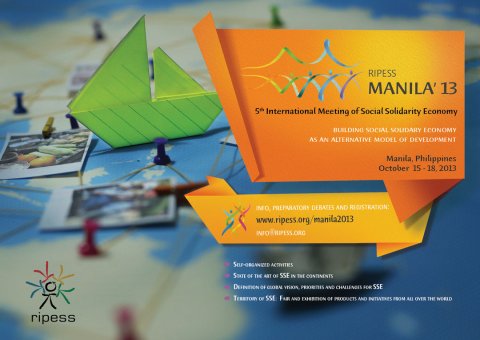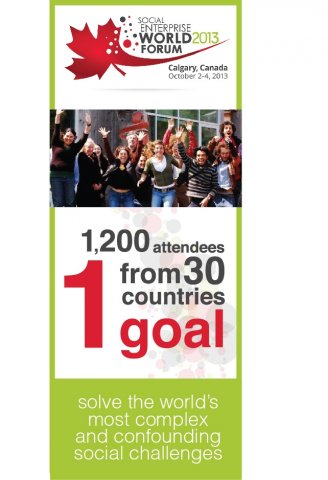 This week, the Credit Union Central of Canada awarded the National Credit Union Community Economic Development Award to Vancity for their Resilient Capital Program. Resilient Capital is dedicated to accelerating the growth of enterprises with proven business models that add to the social, economic and environmental well-being of their communities. To date, Resilient Capital has invested more than $4 million in eleven social enterprises focused on addressing social and environmental challenges, and building resilient communities.
This week, the Credit Union Central of Canada awarded the National Credit Union Community Economic Development Award to Vancity for their Resilient Capital Program. Resilient Capital is dedicated to accelerating the growth of enterprises with proven business models that add to the social, economic and environmental well-being of their communities. To date, Resilient Capital has invested more than $4 million in eleven social enterprises focused on addressing social and environmental challenges, and building resilient communities.
Launched in 2011 in partnership between Vancity and the Vancouver Foundation, the Resilient Capital Program offers depositors the opportunity to make a guaranteed fixed return on their money while backing social enterprises with high growth potential. This successful program has attracted more than 20 institutional and individual depositors who collectively have contributed over $13.5 million in Resilient Capital Term Deposits, including a $3.5 million loan loss reserve provided by the two partners. Vancity was able to leverage its $1.75M investment to create this fund that is expected to reach $15M by summer, 2013.
The Resilient Capital Program offers:
- Equity investments and loans in highly impactful social enterprises;
- Funded by CUDIC insured term deposits offered by Vancity; and
- Secured by loan loss reserve (Vancity and Vancouver Foundation dollars)
To date, Resilient Capital has invested more than $3.5 million in over ten social enterprises focused on addressing social and environmental challenges and building more resilient communities. The number and diversity of community partnerships supported and spawned by the program is no less impressive.






 is a collaboration between the University of Winnipeg’s Community Renewal Corporation and SEED Winnipeg. It is designed to serve up delicious and locally-sourced food, all while offering meaningful employment opportunities to inner-city residents. In addition to the U of W campus restaurant, Diversity also offers a catering service, so call them for your next meeting, gathering or party.
is a collaboration between the University of Winnipeg’s Community Renewal Corporation and SEED Winnipeg. It is designed to serve up delicious and locally-sourced food, all while offering meaningful employment opportunities to inner-city residents. In addition to the U of W campus restaurant, Diversity also offers a catering service, so call them for your next meeting, gathering or party.
 is a volunteer-led organization that will come pick your fruit and share the yield between yourself, themselves, and community groups. Started in 2010, the initiative is now active in several Manitoba communities, working to eliminate wasted fruit and foster a greater sense of community. If you have more fruit in your yard than you know what to do with, give Fruit Share a call, and know that it will be put to productive use.
is a volunteer-led organization that will come pick your fruit and share the yield between yourself, themselves, and community groups. Started in 2010, the initiative is now active in several Manitoba communities, working to eliminate wasted fruit and foster a greater sense of community. If you have more fruit in your yard than you know what to do with, give Fruit Share a call, and know that it will be put to productive use.
 offers you a delicious meal and makes known the gifts of people with developmental disabilities. It was established as social enterprise in 2012, and has since encouraged the public to interact with and get to know a person with a disability over a cup of coffee, thus fostering greater levels of inclusion and equality. Also keep L’Arche Tova Cafe in mind for your future catering needs.
offers you a delicious meal and makes known the gifts of people with developmental disabilities. It was established as social enterprise in 2012, and has since encouraged the public to interact with and get to know a person with a disability over a cup of coffee, thus fostering greater levels of inclusion and equality. Also keep L’Arche Tova Cafe in mind for your future catering needs.  is a non-profit social enterprise operated by the West Broadway Community Organization that offers two delicious gourmet soups each week (one vegetarian and one with meat). Soups are prepared in such a way that provides supportive employment opportunities to Winnipeg’s downtown/core area; the program promotes local food security and environmental sustainability.
is a non-profit social enterprise operated by the West Broadway Community Organization that offers two delicious gourmet soups each week (one vegetarian and one with meat). Soups are prepared in such a way that provides supportive employment opportunities to Winnipeg’s downtown/core area; the program promotes local food security and environmental sustainability.  began its main operation, the Rainbow Community Gardens, in 2008. The membership of the co-operative is made up of newcomers to Winnipeg (and in most cases Canada), who are encouraged to grow their own fruits and vegetables, from which produce is retained by the families but also shared within their community and local markets.
began its main operation, the Rainbow Community Gardens, in 2008. The membership of the co-operative is made up of newcomers to Winnipeg (and in most cases Canada), who are encouraged to grow their own fruits and vegetables, from which produce is retained by the families but also shared within their community and local markets.  is a social enterprise and pre-employment program that offers delicious city-wide catering options. The program provides hands-on training in and for the hospitality industry. Participants are able to operate a community store and participate in cooking classes, a breakfast program and the catering business.
is a social enterprise and pre-employment program that offers delicious city-wide catering options. The program provides hands-on training in and for the hospitality industry. Participants are able to operate a community store and participate in cooking classes, a breakfast program and the catering business. was founded in 1972 and has been working to provide accessible primary health care, counseling and childcare every since. Working in the tradition of alternative health models of the Canadian Prairies, NorWest offers an array of empowering health services to its members and partners; it is the only health co-op in Manitoba.
was founded in 1972 and has been working to provide accessible primary health care, counseling and childcare every since. Working in the tradition of alternative health models of the Canadian Prairies, NorWest offers an array of empowering health services to its members and partners; it is the only health co-op in Manitoba. 
 services; whether it be the use of their environmentally
services; whether it be the use of their environmentally provides conflict resolution services and valuable professional development programs for non-profit organizations.The Skills Centre, which is run by Mediation Services Winnipeg, operates on the belief that effective conflict resolution skills can help you at work, in your personal relationships, and at home.
provides conflict resolution services and valuable professional development programs for non-profit organizations.The Skills Centre, which is run by Mediation Services Winnipeg, operates on the belief that effective conflict resolution skills can help you at work, in your personal relationships, and at home.  is an acronym for Building Urban Infrastructure for Local Development. This non-profit social enterprise retrofits low-income homes to be more efficient and environmentally sustainable while employing members of its community who face multiple barriers to employment. Its work builds community and the economy while improving the environment.
is an acronym for Building Urban Infrastructure for Local Development. This non-profit social enterprise retrofits low-income homes to be more efficient and environmentally sustainable while employing members of its community who face multiple barriers to employment. Its work builds community and the economy while improving the environment.
 runs Winnipeg’s only carsharing service, offering the benefits of having access to a vehicle without the financial and environmental burden of owning one. This budding cooperative maintains support for alternative modes of transportation such as biking and public transit, but should you require the use of a car from time to time, then look no further and contact Peg City Car Co-op today.
runs Winnipeg’s only carsharing service, offering the benefits of having access to a vehicle without the financial and environmental burden of owning one. This budding cooperative maintains support for alternative modes of transportation such as biking and public transit, but should you require the use of a car from time to time, then look no further and contact Peg City Car Co-op today.
 stands for the Brandon Energy Efficient Program, and since 2007 it has been increasing the energy and water efficiency of Brandon’s affordable housing stock. It develops unskilled workers with limited work experience into capable craftspeople who work to make their communities stronger and more environmentally responsible.
stands for the Brandon Energy Efficient Program, and since 2007 it has been increasing the energy and water efficiency of Brandon’s affordable housing stock. It develops unskilled workers with limited work experience into capable craftspeople who work to make their communities stronger and more environmentally responsible.
 is a social enterprise with the goal of being self-sustaining employee-owned company, and it serves a variety of clients in the commercial renovations sector. Founded in 2002, ICR continues to create quality jobs for low income people who live in Winnipeg’s inner-city, which strengthens the communities in which they work.
is a social enterprise with the goal of being self-sustaining employee-owned company, and it serves a variety of clients in the commercial renovations sector. Founded in 2002, ICR continues to create quality jobs for low income people who live in Winnipeg’s inner-city, which strengthens the communities in which they work. 


 This brief was prepared by the Canadian Community Economic Development (CED) Network for the Sustainable Development Office at Environment Canada as part of its consultations on the Draft Federal Sustainable Development Strategy 2013-2016.
This brief was prepared by the Canadian Community Economic Development (CED) Network for the Sustainable Development Office at Environment Canada as part of its consultations on the Draft Federal Sustainable Development Strategy 2013-2016. At the Annual General Meetings of the
At the Annual General Meetings of the 


 As recently reported by
As recently reported by 
 Vancouver’s Community Housing Land Trust Foundation is a registered charity created two decades ago by the Co-operative Housing Federation of BC. Under the new agreement, Vancouver will lease four city-owned parcels of land to the Land Trust Foundation. It in turn will sub-lease those sites to four partners to develop affordable rental-housing units.
Vancouver’s Community Housing Land Trust Foundation is a registered charity created two decades ago by the Co-operative Housing Federation of BC. Under the new agreement, Vancouver will lease four city-owned parcels of land to the Land Trust Foundation. It in turn will sub-lease those sites to four partners to develop affordable rental-housing units.